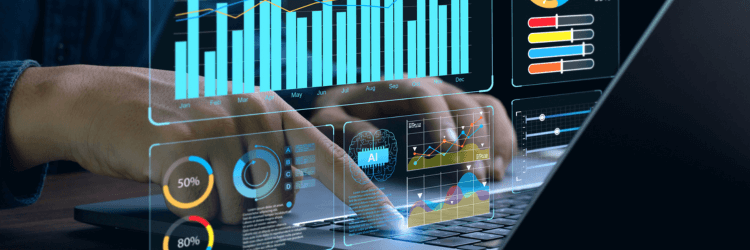Top Benefits of Using AI for Sales in 2025

The sales landscape has undergone a seismic shift over the past few years, and 2025 is no exception. With more tools, data, and customer demands than ever before, sales teams are expected to juggle competing priorities: hitting ambitious quotas, nurturing leads, managing complex pipelines, and delivering personalized customer experiences at scale. The pressure is on to do more, faster, and better.
This is where AI for sales comes in. No longer a buzzword, artificial intelligence is now a cornerstone of modern sales strategies. It’s the technology that enables sales professionals to work smarter, not harder—empowering teams to streamline repetitive tasks, uncover valuable insights, and engage prospects in meaningful ways. From startups to established businesses, sales teams everywhere are turning to AI for sales to stay ahead of the competition.
But what does that look like in practice? Imagine a world where your leads are automatically prioritized based on their likelihood to convert, your emails are optimized for engagement without lifting a finger, and your pipeline forecasts are so accurate that you can plan months in advance with confidence. That’s not the future—that’s happening right now, thanks to AI for sales.
In this article, we’ll dive into the top benefits of using AI for sales in 2025. Whether you’re a sales leader aiming to optimize your team’s performance or an SDR looking for tools to give you an edge, these insights will show you how AI can transform your sales strategy and drive better results.
Smarter Lead Generation with AI for Sales
Lead generation has always been a critical—and often time-consuming—part of the sales process. Traditionally, sales teams relied on intuition, manual research (Donna can automate that), and trial-and-error to identify potential customers. But in 2025, AI for sales has revolutionized how teams approach this challenge, making lead generation smarter, faster, and more effective.
AI-powered tools can analyze massive datasets in real-time, identifying patterns and signals that indicate a prospect’s likelihood to engage. These tools use advanced algorithms to evaluate factors like company size, industry, online behavior, and past interactions, helping sales teams zero in on high-quality leads with precision.
Imagine being able to instantly prioritize your most promising leads, without wasting time on prospects who are unlikely to convert. With AI for sales, that’s exactly what’s possible. Instead of spending hours combing through lists, your team can focus on engaging with the right people at the right time.
Take lead scoring as an example. AI tools can automatically rank leads based on their readiness to buy, combining historical data with predictive insights. This means your team can allocate resources more strategically, maximizing their chances of closing deals.
In short, AI for sales takes the guesswork out of lead generation. It equips sales teams with the data and tools they need to be more targeted, efficient, and effective—turning what used to be a daunting process into a streamlined, results-driven strategy.
Elevating Customer Engagement: How AI Makes It Personal
In sales, connection is everything. But in a world where buyers are inundated with generic pitches and cookie-cutter messaging, standing out requires something extra. This is where AI transforms customer engagement from ordinary to extraordinary.
- Personalized Outreach at Scale
AI tools analyze customer data—like past interactions, preferences, and behaviors—to craft messages that resonate. No more guesswork or one-size-fits-all emails. Instead, sales reps can deliver hyper-relevant communication that feels tailor-made for each prospect. - Timing Is Everything
AI for sales doesn’t just personalize content; it optimizes timing too. By tracking signals like email opens, website visits, and engagement patterns, AI tools ensure your outreach lands when prospects are most likely to respond. - Building Deeper Relationships
Personalized engagement isn’t just about closing deals—it’s about fostering trust. When customers feel understood and valued, they’re more likely to stay loyal. AI equips sales teams with insights to nurture long-term relationships, not just transactions.
Example in Action
Picture this: A prospect receives a perfectly timed email offering a solution to a pain point they just searched online. That’s not luck—that’s AI for sales in action, ensuring every interaction is meaningful and impactful.
With AI, sales teams can shift from reactive to proactive engagement, creating experiences that don’t just convert leads but delight customers at every step.
Here’s the revised Accurate Sales Forecasting Powered by AI section with examples of AI tools included:
Accurate Sales Forecasting Powered by AI
Forecasting has always been a cornerstone of successful sales strategies. But let’s be honest—traditional methods often leave room for error. Manual projections, gut instincts, and incomplete data can lead to missed targets and wasted resources. Enter AI-powered sales forecasting, a game-changing approach that takes the guesswork out of planning.
Why Accurate Forecasting Matters
Accurate sales forecasting isn’t just about hitting quotas; it’s about making smarter business decisions. When you know what’s coming, you can allocate resources more effectively, plan campaigns with confidence, and align your team around achievable goals.

How AI Improves Forecasting
- Data-Driven Predictions: AI for sales uses historical data, industry trends, and real-time market insights to create highly accurate forecasts. By analyzing patterns that humans might miss, AI tools like Clari and Aviso provide sales teams with actionable insights and reliable projections.
- Adaptive Insights: Unlike static methods, AI forecasting evolves. It learns from new data and adjusts predictions as conditions change, keeping your strategy aligned with reality. Tools like Salesforce Einstein leverage AI to continuously refine forecasts based on new inputs.
- Identifying Risks and Opportunities: AI can flag potential bottlenecks or highlight untapped opportunities, giving you a proactive edge in managing your pipeline.
The Bottom Line
With AI-powered forecasting, sales leaders can approach the future with confidence. Teams can avoid overpromising, underdelivering, or leaving money on the table. Instead, they gain clarity and control—two priceless assets in today’s competitive sales environment.
Real-World Results
Companies using AI tools like Clari, Aviso, and Salesforce Einstein for sales forecasting report improved accuracy and better decision-making. Teams can focus on executing strategies instead of second-guessing projections, driving efficiency and results.
In 2025, staying ahead means embracing tools that make your team more agile, informed, and proactive—and AI for sales forecasting is leading the charge.
Here’s the draft for the Boosting Sales Team Productivity with Automation section:
Boosting Sales Team Productivity with Automation
Sales teams are often stretched thin, juggling countless tasks from updating CRMs to following up with leads. These repetitive, time-consuming activities can eat into the hours that should be spent building relationships and closing deals. That’s where AI-powered automation steps in, giving sales teams the productivity boost they need to focus on what really matters.
The Role of Automation in Sales Productivity
- Automating Repetitive Tasks:
AI tools can handle mundane tasks like data entry, scheduling meetings, and sending follow-up emails. For instance, platforms like HubSpot and Outreach.io use AI to automate email sequences and ensure no prospect falls through the cracks. - Streamlining CRM Management:
Sales reps often dread updating their CRM systems. AI for sales tools like Chorus.ai and Gong.io automatically log call data, extract key insights, and sync them with your CRM. This eliminates the need for manual updates and ensures that data is always accurate and up-to-date. - Simplifying Meeting Preparation:
Tools like Donna (that’s us!) prepare sales reps for meetings by delivering personalized insights, highlighting key talking points, and analyzing prospect data—all in seconds. This means reps can walk into every meeting ready to impress.
The Impact on Productivity
By automating repetitive tasks, AI doesn’t just save time—it empowers sales teams to focus on high-value activities, like building connections and closing deals. Studies show that sales reps using AI for sales tools can reclaim up to 30% of their time, boosting overall efficiency and job satisfaction.
A Smarter, Happier Sales Team
Automation also reduces burnout. With fewer administrative tasks to manage, reps can dedicate their energy to creative problem-solving and strategic thinking. The result? A more engaged, motivated, and high-performing sales team.
Real-Time Coaching and Actionable Insights: Supercharging Sales Performance
Sales reps often learn best on the job, but real-time coaching has traditionally been a challenge—especially when it comes to understanding what went wrong during a sales call or how to improve a pitch mid-conversation. Thankfully, AI for sales is changing the game by offering instant feedback and actionable insights that help sales teams optimize their performance in real time.
How AI Provides Real-Time Coaching
AI-powered tools like Brainshark and Refract are designed to analyze sales conversations as they happen. These platforms listen to calls, identify key moments, and provide immediate feedback on everything from tone and pacing to the types of questions asked. For example, if a rep misses an opportunity to ask a key discovery question, AI can flag this in real time, giving the rep a chance to adjust and re-engage the prospect before the call ends.

Turning Conversations into Insights
- Instant Analysis: AI can evaluate sales calls, emails, and meetings to extract valuable insights. This could be feedback on how well the rep aligned with the prospect’s pain points or how effectively they demonstrated product value.
- Identifying Improvement Areas: AI tools can pinpoint areas where a rep may need additional training or support. For instance, if a rep consistently struggles with handling objections in certain types of sales situations, AI can highlight this trend and suggest targeted coaching sessions.
The Power of Data-Driven Sales Coaching
Unlike traditional feedback methods, which can be delayed or subjective, AI for sales provides data-driven coaching that’s both timely and relevant. Reps receive personalized insights based on their own performance, not general recommendations. This allows sales leaders to coach more effectively and tailor their training to each individual’s strengths and weaknesses.
Imagine a rep navigating a complex negotiation. AI tools like Brainshark and Refract can provide real-time guidance on things like pacing, tone, and objection handling. If a rep misses a key moment to address a prospect’s concern, these tools instantly offer suggestions for improvement—allowing the rep to adjust and enhance the conversation in real-time.
With real-time coaching powered by AI, sales teams can continuously improve, adapt to buyer behavior, and ultimately close more deals. It’s like having a personal coach in your pocket, guiding you every step of the way.
Here’s a comprehensive conclusion to wrap up the article:
Conclusion: AI for Sales—Empowering Teams for Success in 2025
As we move into 2025, the landscape of sales is rapidly changing. Gone are the days when sales teams had to rely solely on intuition, manual processes, and traditional methods to generate leads, engage customers, and forecast revenue. In today’s world, AI for sales is no longer a luxury—it’s a necessity. From smarter lead generation and personalized customer engagement to real-time coaching and accurate forecasting, AI-powered tools are reshaping every aspect of the sales process.
Smarter Lead Generation with AI means that sales teams can now target the right prospects with greater precision, saving time and improving their chances of success. Instead of wasting hours on leads that may never convert, sales reps can focus their efforts on high-quality opportunities that are more likely to close. AI helps identify the signals that indicate a prospect’s readiness, allowing teams to prioritize their efforts and maximize their impact.
Elevating Customer Engagement with AI enables sales teams to provide more personalized, timely, and relevant interactions. By leveraging AI, sales reps can craft messages that truly resonate with each prospect, increasing the chances of building meaningful relationships and closing deals. With AI handling the heavy lifting of timing and personalization, reps can focus on deepening connections and offering real value to their customers.
Accurate Sales Forecasting Powered by AI is revolutionizing how teams plan and execute. With AI tools constantly learning from new data, sales leaders can make more informed decisions, adjust strategies on the fly, and ensure that their teams are aligned with realistic, achievable goals. AI eliminates the guesswork, empowering sales teams to approach the future with confidence, knowing that their forecasts are based on data, not assumptions.
Boosting Sales Team Productivity with Automation frees up sales reps to do what they do best—sell. With AI automating repetitive tasks and streamlining workflows, sales teams can reclaim valuable time that was once spent on administrative duties. Whether it’s managing CRM data, sending emails, or preparing for meetings, AI is a game-changer in helping sales teams work smarter, not harder.
Finally, Real-Time Coaching and Actionable Insights offer immediate feedback that enhances performance during every sales interaction. AI tools that analyze conversations in real time provide invaluable coaching tips that help sales reps improve on the spot, turning every call into a learning opportunity. This not only leads to more effective sales interactions but also fosters a culture of continuous improvement across the entire sales team.
The bottom line is clear: AI for sales is the key to staying competitive in 2025 and beyond. As sales teams face increasing pressure to meet targets, adopt new technologies, and deliver exceptional customer experiences, AI will continue to play a central role in helping them achieve these goals. It’s not about replacing sales reps—it’s about empowering them with the tools they need to succeed at a higher level.
For companies looking to scale, improve sales performance, and enhance team productivity, adopting AI for sales isn’t just an option—it’s a strategic imperative. The future of sales is smarter, more efficient, and driven by data. Embracing AI is the best way to ensure your team thrives in this new era of sales.
With AI as a trusted partner, sales teams can unlock new levels of success, efficiency, and growth. The opportunities are endless—what will you achieve with the power of AI at your side?
Make. Every. Meeting. Count.
Donna is your secret sidekick that will have people asking how you show up to every meeting so damn prepared.